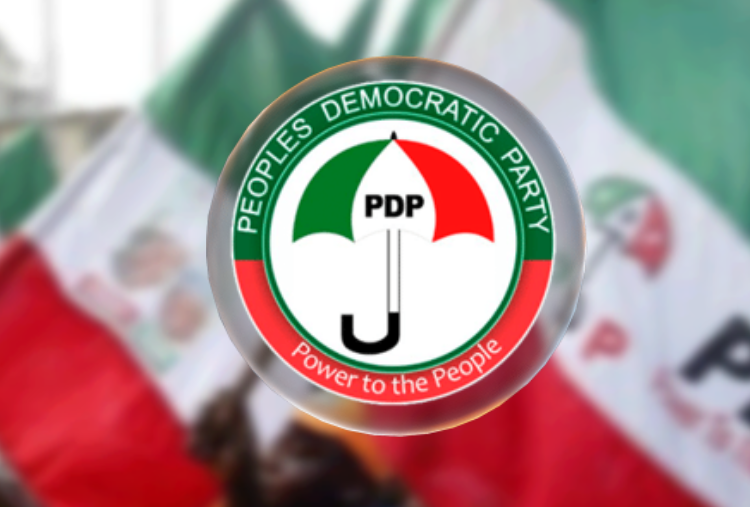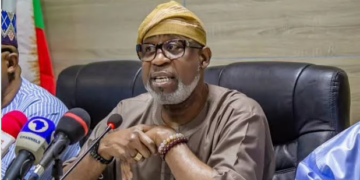The Peoples Democratic Party (PDP) has cautioned the Nigerian Senate against hastily confirming President Bola Tinubu’s nominee for the position of chairman of the Independent National Electoral Commission (INEC), urging lawmakers to uphold the sanctity of Nigeria’s democracy by conducting a thorough and transparent screening process.
Speaking at a press conference at the PDP National Secretariat in Abuja on Friday, the party’s National Publicity Secretary, Debo Ologunagba, said the Senate must not act as a “rubber stamp” in the confirmation of Professor Joash Ojo Amupitan (SAN), who was nominated by the President to replace outgoing INEC Chairman, Professor Mahmood Yakubu, whose tenure expires this month.
“The credibility of our electoral system rests heavily on the independence and impartiality of INEC,” Ologunagba said. “What we expect is that the Senate will do its job. If the nominee is found worthy of confirmation, then he must be guided by the urgent need to strengthen democracy, rebuild public confidence in the electoral system, and eliminate widespread doubts surrounding the commission’s credibility.”
Recall that President Tinubu had on Thursday forwarded Amupitan’s name to the National Council of State, which gave unanimous approval, paving the way for Senate screening in the coming days.
But, the PDP spokesperson warned that the upper legislative chamber must “discharge its constitutional responsibility with diligence and integrity,” adding that “Nigerians are watching closely.”
“We recognise that our Constitution empowers the President to nominate, in consultation with the Council of State. That process has been followed,” he said. “But the Constitution also entrusts the Senate with the critical role of confirming such a nominee on behalf of the Nigerian people. That responsibility must not be trivialised.”
Ologunagba maintained that the PDP’s position was rooted in the belief that strong democratic institutions, not strong individuals, should define governance in Nigeria.
“When institutions are allowed to function independently, the personalities occupying them become secondary,” he stated. “We established that tradition during our time in office, and we expect nothing less from those in power today.”
He further noted that the international community would be watching closely as Nigeria enters another crucial electoral cycle, stressing that INEC must demonstrate competence, neutrality, and transparency.
“INEC has received tremendous international support,” Ologunagba said. “The world is watching. Nigerians are no longer willing to tolerate excuses or inefficiencies from the commission. The days of non-inclusive elections are over.”
Turning to recent reports of defections from the PDP, Ologunagba dismissed them as part of a “coordinated propaganda effort” by the ruling All Progressives Congress (APC) to create an illusion of disunity within the opposition.
He alleged that financial inducement and intimidation were being used to lure lawmakers from the PDP.
“These defections are not borne out of ideology or principle; they are induced, pure and simple,” he claimed. “It has been the modus operandi of the APC , coercion, intimidation, and harassment.”
The PDP spokesman, however, insisted that such defections would not influence the outcome of the 2027 general elections, arguing that Nigerians’ dissatisfaction with governance under the APC would be the ultimate deciding factor.
“What will shape 2027 is not how many people decamp. It is the insecurity that has gripped every corner of our country. It is the economic hardship that has made life unbearable for the average Nigerian. It is the failure of a government that is not responsive to the cries of the people.”
He added that the ruling party’s anxiety was growing as the PDP consolidated ahead of its forthcoming national conventi
“The APC is jittery because the PDP is moving steadily towards its convention. That unity frightens them. But they will be disappointed. We are together, and we are focused.”
Ologunagba took a swipe at the APC’s governance record, accusing it of neglecting the welfare of Nigerians while fixating on political maneuvering.
“Nigerians have not decamped from hunger, but they certainly want to,” he quipped. “And when they do, they will come to the PDP, a party of prosperity, of hope, and of the people. That’s not just a slogan; it’s backed by our track record.”
He concluded by drawing a symbolic contrast between both parties, “The PDP is about people. The APC is about a congress that takes care of its own. But the people are with us. And in 2027, these APC people we see today, we shall see them no more.”





